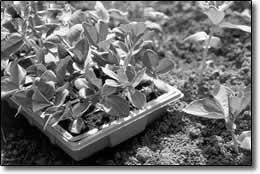
What’s your GardenGram?
by Chef Boy Ari

The other day I was at home studying a seed catalog when my friend Spice dropped by to borrow my hammer drill. She just bought her first house, and she's tearing into it with the fervor of a young missionary on her first assignment: bathroom renovation, new fence, wall removal.
"Gosh," said Spice, eyeing my ambitious seed order. "I'd love to grow a garden this year, but I won't have time." Thus she steered clear of my seed catalog and kept her life simple.
But I know something she doesn't. One sunny Saturday in late May, the air will smell like drying mud and fresh flowers. The trees will have new leaves, birds will be singing, and Spice will be strolling the Farmer's Market, where she will observe various baby plants for sale: kale, peppers, cucumbers, herbs and the all-time champion seductress of spontaneous gardeners: the tomato start.
Spice will buy some starts, even if the glory of springtime is pulling her in 50 directions at once. It's just so damn easy to buy a start and think: "Stick this in the ground and get free tomatoes."
If the ground is prepared, that is.
Thus, my advice to Spice: Yes, forget about seeds, but prepare for the impulse garden. Clean out the garden spot abandoned by the previous owners. Turn the soil, mix in some manure and peat moss. Then, when the inevitable seduction occurs, Spice can take her tomato plant home, stick it in the ground and get free tomatoes.
I'm able to say these things with such confidence because I am a student of gardens and a student of those who work them. This is complex stuff, so to help sort out the myriad personalities you find in the fields of dirt, I've created the GardenGram System.
My GardenGram System is based on the wildly popular Enneagram Personality Type Indicator System (www.enneagraminstitute.com), which includes a personality test that places people into one of nine categories: Reformer, Helper, Achiever, Individualist, Investigator, Loyalist, Enthusiast, Challenger or Peacemaker.
Not to be outdone, my GardenGram System places people into one of 69 categories based on their relation to their gardens. Once you know your GardenGram, then I can tell you how to grow.
Here are some examples:
The Hardly Variety has little intention of doing anything in the garden and is perfectly content buying all of his or her food enclosed in plastic. This isn't to say that he/she disapproves of gardening; it just isn't his or her bag.
The Butterfly flits around the garden - often with beer in hand - while others are gardening. He or she plucks a weed here, a strawberry there, but mostly just hangs out. While the Butterfly may appreciate the importance of gardening, he/she ultimately uses the garden for its socializing opportunities.
The Workhorse is the opposite of the Butterfly. The Workhorse keeps moving, leaving a wake of change. Unlike the Butterfly, the Workhorse is able to garden and talk at the same time. And unlike the Butterfly, the Workhorse is able to exist happily in a silent garden. Workhorses tend to create straightforward, functional garden plans, which they follow to completion.
I belong to the category known as the Big Planner. The Big Planner starts the year with grand ambitions, buying enough seeds to start a small farm. He fills many greenhouse trays with potting soil and grows many seedlings, which he transfers to his laboriously prepared beds. By the time summer rolls around, the Big Planner has lost interest in the jungle he has created. Lettuce goes to seed, tomatoes split and weeds choke the fields.
The Produce Rescuer is unable to bear the thought of waste. He/she rescues the abandoned produce of the Big Planner, only to have it rot in the back of his/her fridge. Like the Big Planner, the Produce Rescuer has a problem with following through (i.e., doing anything with the rescued produce). Not surprisingly, the Produce Rescuer is a strong candidate for co-dependency with the Big Planner.
The Humble Yet Spontaneous Garden Warrior is the category to which Spice belongs. She is a warrior because she attacks the task at hand and follows through to completion. For this reason, she is hesitant to bite off more than she can chew, and thus she remains humble. Humble Yet Spontaneous Garden Warriors, like Workhorses, can get a lot done - but unlike Workhorses, they are impulsive. That's why I encouraged Spice to create the opportunity to grow a spontaneous yet manageable garden.
Unfortunately, my 69-category GardenGram System is not yet ready for release - and, more important, marketing - to the general public. But hopefully these examples will help you examine yourself and arrive at your GardenGram Type. Once you know which sort you are, you should be able to prepare for a rewarding growing season.
|